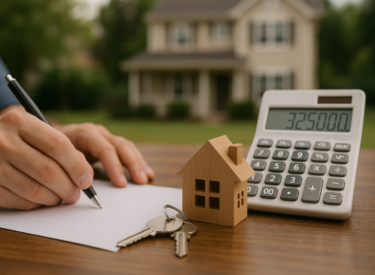We all want to buy our new home or investment property at the lowest price possible.
Or at least get good value for our money.
And of course, the vendor wants the most he can get for his property, especially in today's market where property values are strong.
Yet you now know that the asking price quoted by the selling agent will usually be more than the owner is willing to accept.
It's just part of the real estate game - they expect to come down in price as part of the negotiation process.
So when making an offer on a house, what should you do?
House asking price vs offer price
You are probably thinking that the agent just wants to make a sale, and in most cases you are right - in reality, the agent doesn't get paid unless a sale is made, so obviously, he is keen to sell you the house.
But most agents prefer an easy negotiation, knowing that sellers get offended when they receive low offers on their homes.
This means they will probably recommend you make an offer close to the asking price.
So unless you use a buyers' agent to help you negotiate, you are really going to have to rely on your own research to work out what the property is worth.
By the time you end up at the negotiation table, you should have put some of these into practice, looked at many homes, and gotten a pretty good idea of what similar homes in the area have sold for.

Note: Remember, it's the sale price, not the asking price that you need to focus on when you're doing your pre-negotiation homework.
In most markets (other than during boom times), houses sell for considerably less than their asking price.
There is no standard discount, but as everyone knows there will be some 'argy-bargy' about the price as agents tend to list the property for sale at an asking price usually about 5-10% more than the vendor will accept to sell their home.
If you pay what the seller is asking you could be wasting money.
The trick is to know how much less the seller will accept.
Sometimes it's only a few thousand dollars.
Frequently it's about 10% or more, but in a seller's market - a hot market, where there are multiple buyers making an offer on a house like we are now experiencing - vendors may not be willing to drop the asking price at all.
Is it worth getting a valuation?
Another way to determine the market value of the home is to have a valuation done.
Your lender will usually organise a valuation as part of the loan process, but this will occur after the deal has been done.
I've heard some people wonder if it's worth having a valuation done prior to making an offer on a house or making their offer subject to a satisfactory valuation.
Not many sellers accept this type of condition and it's possible you will lose out to somebody else who will buy the property without this type of condition.
The trouble with engaging a valuer is that it usually takes 3-4 days or even up to a week before you get their report, and it may cost you $400 to $600.
If you have the time and want a professionally acquired figure, then a valuer may be the way to go.
The valuation report may even provide you with ammunition to use in the negotiation process.
While your lender will require a valuation on the property as part of your finance application, not all valuers are approved by certain lenders.
Each lender only works with a small group of valuers (called their valuation panel).
This means that if you pay for a valuation for your purposes, it may not be accepted by your lender.
And remember that if you ultimately don't buy the property, you will still have to pay for the valuation.
So to help you determine what price you should offer if you're considering buying a house I’ve put together 10 steps for how to make an offer on a house, and 5 questions to ask the agent before making that offer.
10 steps to making an offer on a house
Here’s what you need to do to have the best chance of making the home your own.
1. Get your finance pre-approved
Pre-approval is a good way of gauging whether or not a bank is going to give you a loan to cover what you need to get the house - a mortgage broker can help you with this.
Remember, pre-approval is not a binding agreement, and it only becomes so once they’ve checked and approved the particular property you have chosen and you’ve fulfilled all the bank’s requirements.
2. Consult a solicitor or conveyancer
Before you make an offer, you may wish to first consult with a solicitor or conveyancer who can outline your rights and obligations.
An offer placed on a property can become a legally binding contract if it’s accepted, so engaging a lawyer early in the process can help mitigate any miscommunication surrounding the agreement.
3. Research similar properties in the area
The best way to know whether your offer is reasonable is to look at trends in the specific area you’re searching in.
You need to research similar properties in the same area to get a good gauge of what the property is worth.
4. Consider what conditions of sale you might have
An offer on a property is usually made either conditionally or unconditionally.
An unconditional agreement means that the property is purchased in its current state.
Conditional sales usually occur when the purchaser already has pre-approval, an inspection has been completed, and the buyer is happy with the property as it stands.
A conditional sale, which gives the purchaser more flexibility, is a sale with conditions attached.
Usually, the conditions involve the buyer’s finance, the completion of the relevant inspections, or if maintenance needs to be completed prior to settlement.
5. Arrange building and pest inspections
There are various inspections required as part of the sale of a property.
This generally includes pest and building inspections to ensure the property is up to code, and that there are no issues with pests or no potential issues brewing.
The inspections also help to foresee whether there may be any building issues down the track.
6. Prepare your offer
It is common for vendors to have unrealistic expectations of what their house is worth.
If you have done your research, you will have a much better idea of the value of the property than the vendor and often even the real estate agent.
Your initial offer should be within 5% to 10% below what you are prepared to pay, to give you some room for negotiation.
For example, if the property you want to buy is on the market for $550,000, then your first offer would be around $520,000.
Keep in mind though that there may be other buyers, so starting low may mean you miss out.
7. Review the contract of sale
Well before you make an offer, review the contract of sale.
There may be conditions included that become part of a negotiation or that do not suit your requirements or there might be conditions in there that force a purchaser out of the game completely.
The contract of sale details a number of factors, including the deposit amount and due date, settlement date, and any inclusions.
8. Sign the contract of sale or ‘expression of interest’
When the contract is signed by both parties (the buyer and the seller) it becomes a legal and binding document.
Prior to this, a holding deposit is often paid.
But don’t be confused - this is different from the larger, say 10%, a deposit which probably took you months or even years to save up.
This holding deposit is a small amount that you give the selling agent to show that you are serious about purchasing the property.
This holding deposit is fully refundable if the contract does not exchange and is just a way for the buyer to show the seller they are serious about proceeding.
9. Pay the deposit
Once the contract of sale is signed and exchanged the buyer is required to pay a deposit (usually 10% of the purchase price) as a sign of good faith in their interest in the property, and this is held in trust by the real estate agent, solicitor or conveyancer.
The amount of deposit can vary and is generally stipulated by the seller or their agent.
These ‘holding deposits’ are generally non-refundable but this varies by state.
10. Wait for the cooling period to end
If the vendor accepts your offer then you’ll have a predetermined amount of time, usually around a week, to have any conditions you’ve attached met.
Bank approval will generally take a few days and a building and pest inspection will also generally take a few days to organise and complete.
Once the time is up and the conditions are met then the offer is unconditional - if the conditions aren’t met then it’s time to negotiate or ask for more time.
If the home hasn’t passed the building inspection then you can consider whether you’re comfortable with the state of the home and potentially lower the offer to cover the cost of repairs.
If the finance hasn’t been approved then you’ll need to ask for more time (which can result in financial penalties) or risk losing the deposit.
But once the conditions have been met and the cooling period has elapsed, then, congratulations - at this point the property is yours.
5 questions to ask the agent before making an offer
If you ask the selling agent what price you should offer, you're asking the wrong person.
Remember, the agent is paid by the seller to represent them and to get the best price possible.
However, it's usually still worth asking them what they would consider a «fair offer» and then asking them to justify it with a list of comparable sales.
1. How did the vendor come to the asking price for their home?
Was it from the agent's suggestion or because that's how much they need to buy their next dream home?
Some sellers are unrealistic and unlikely to come down from their asking price if they have to get a certain amount for a particular reason.
2. Have there been any other offers made?
This lets you know if you have any competition and how serious the vendor is about selling their home at a reasonable price.
3. How long has the home been on the market?
If it's just been put up for sale, the seller may not be anxious to accept the first offer.
If the home has been on the market for several months it's more likely the seller would be ready to accept your offer.
4. Why is the vendor selling?
Are they going through a divorce?
Do they have to move interstate urgently?
Have they already bought another home that would put them under pressure to sell their current home?
This will let you know how motivated the seller is.
5. Has the asking price been reduced during the time the property has been on the market?
This will tell you whether the seller is really keen to offload their home and also let you know that you might have a motivated seller on your hands and perhaps greater bargaining power.














